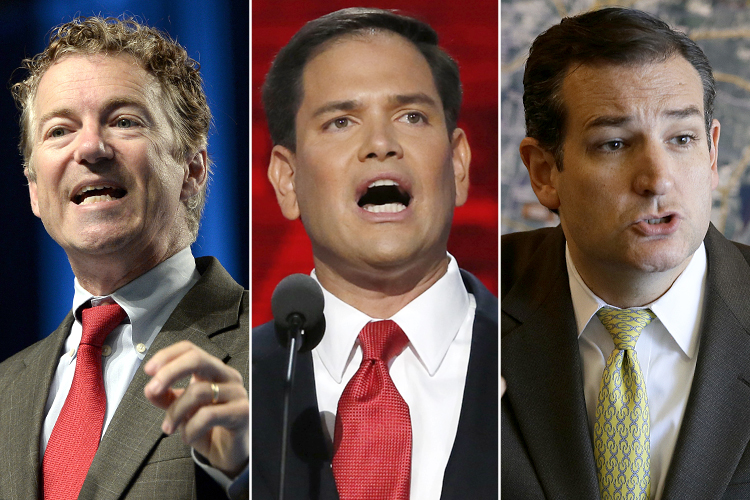In a shocking turn of events, the field of potential presidential candidates reacted negatively to news of a preliminary political framework from the Lausanne nuclear talks yesterday.
“Nothing in the deal described by the administration this afternoon would justify lifting US and international sanctions, which were the product of many years of bipartisan effort,” Jeb Bush said. “I cannot stand behind such a flawed agreement.” This will please the neoconservatives who had begun to worry about Bush’s commitment to omnidirectional global warfare, though he still will have to murder James Baker to fully prove his loyalty.
Florida Senator Marco Rubio, the neocons’ current fling, pretended that he would still have to consider all the details before making up his mind. When he makes up his mind, later, after pretending to consider all the details, he will come to the conclusion, probably, in all likelihood, that this’n here’s a shit deal.
[embedtweet id=”583755142551379969″]
Former Texas Gov. Rick Perry, who is still a thing(?), tweeted, “Americans and our allies are right to be wary of a nuclear deal w/ Iran that is riddled with concessions by the Obama Administration.”
Ted Cruz: not a fan.
Scott Walker, also, too, does not like the political framework for a nuclear deal with Iran.
The absolute best “response,” though, was from our man Sen. Rand Paul. The “old Rand,” who had all sorts of problems but was certainly the type to support diplomatic negotiations over Iran’s nuclear program, remains in conflict with the “new Rand,” the generic defense budget-busting hawk who aims to be president. How did Paul reconcile his two selves? His staff is telling reporters that the senator “is out of pocket with family and not doing any media all week long.” (We’re not sure about the lingo, “out of pocket.” Is this a thing? Does he mean “out of the pocket,” like he’s a quarterback scrambling for his life? That would be apt.) Rand Paul is conveniently not commenting on any news, be it the Iran talks or the Indiana RFRA or the Miley Cyrus/Tom Cotton stand-off, until after he officially announces his presidential bid next week. “Not saying anything” is always Rand Paul’s best option, but it’s not sustainable in the long-term.
There is no final nuclear deal with Iran yet. If there is, that’s going to come at the end of June. Yesterday’s dueling rollouts from the Iranian foreign minister and the P5+1 negotiators suggest that there’s still a lot left to work out. John Kerry and Javad Zarif didn’t seem to be on the same page on several critical issues, including the schedule for lifting sanctions or whether (and which) sanctions would “snap back” into place if Iran is caught violating the deal. It’s hard to tell how much of this is rhetoric — them selling the deal to very different constituencies — and how much represents real gaps that need to be worked out.
If a deal gets done, though, it’s not going to be enough to simply let GOP presidential candidates rail against it. That lets them off too easily. The real question is, what would you do about it if you became president?
The tempting answer will be that they’ll pull out of the deal. Scott Walker and Marco Rubio have said versions of this. Neither has been able to explain away the damage that would do, because there’s no easy answer for that. Rubio insists that “America’s standing in the world” would be enough to persuade our European allies, not to mention the Russians and Chinese, to reimpose sanctions on Iran (to what end, it’s not clear), but he wrongly assumes that America would have standing in the world after blowing up a carefully crafted diplomatic agreement. Iran would never come back to the negotiating table with the United States, leaving the United States with two options for dealing with Iran’s nuclear program: (1) sitting around and hoping that some magical unicorns swoop into Iran, topple its regime, and put in place a United States puppet government or (2) bombing Iran.

